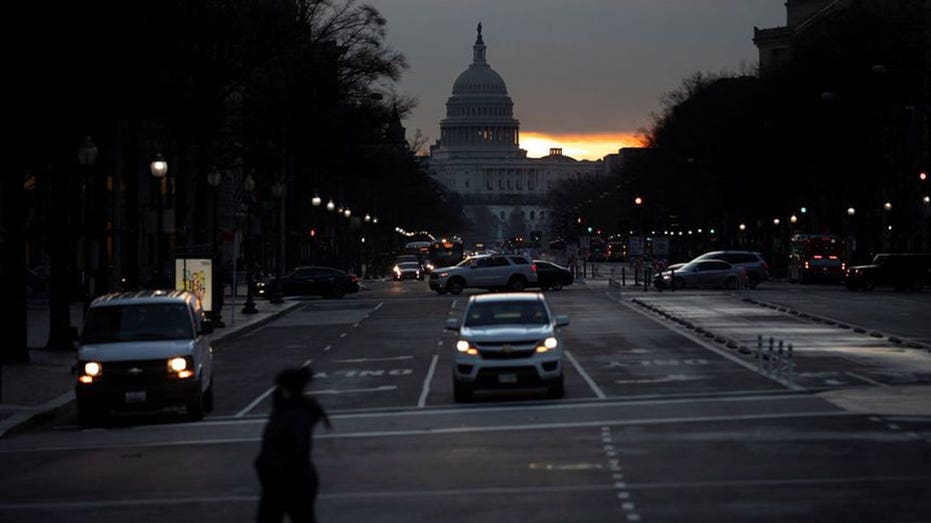Daylight saving time: Lawmakers debate the need for time change as clocks spring forward on Sunday
Congress voted in 2005 to extend daylight saving time by two months
FOX Business Flash top headlines for March 11
Here are your FOX Business Flash top headlines for March 11.
It’s time to Spring Forward again, as most of the U.S. shifts Sunday into daylight-saving time. If it were up to some lawmakers, the lost hour of sleep every March would be but a fixture of the past.
The tradition of setting clocks forward in the spring and backward in the fall has been a source of debate and consternation for decades. Efforts to make daylight-saving time—or, in some cases, standard time—permanent have bubbled up in state houses over the years. But the bipartisan cause to stop the time changes has gained renewed momentum recently, with lawmakers citing studies identifying the negative effects of clock changes on people’s health and the economy.
Eighteen states have passed legislation or resolutions in the past four years making daylight-saving time permanent, according to the National Conference of State Legislatures. In 2022, 28 states are weighing bills regarding the time changes, according to the group, which tracks state laws. The majority of the 68 measures seek to make daylight-saving time the permanent standard—making the changes less likely to be swiftly enacted.
Under current federal law, any state can choose to observe standard time year-round. But states can’t move to follow daylight-saving time permanently without changes to federal law.

A pedestrian crosses Pennsylvania Avenue at sunrise near the U.S. Capitol. Forty-eight states and the District of Columbia observe daylight saving time eight months a year. (TOM BRENNER/REUTERS / Reuters)
BMW RECALLS OVER 917,000 VEHICLES DUE TO ENGINE FIRE RISK
A bipartisan group of senators, including Marco Rubio (R., Fla.) and Ed Markey (D., Mass.), reintroduced legislation in March 2021 to make daylight-saving time the year-round standard. The legislation would allow similar laws passed in states including Florida, Georgia, Delaware, Oregon and Louisiana to take effect. But the bill hasn’t made much progress in the past year.
"Switching in and out of daylight-saving time is outdated," Mr. Rubio said in a video message Thursday, renewing calls for action. "Let’s just lock the clock once and for all and put all this stupidity behind us."
Forty-eight states and the District of Columbia observe daylight-saving time eight months a year, and standard time the remaining four months; Arizona, aside from the Navajo Nation, and Hawaii observe standard time year-round. The U.S. began using daylight-saving time in 1918. The Uniform Time Act in 1966 set the current policy as a way to conserve energy; Congress voted in 2005 to extend daylight-saving time by two months.
The idea was to extend the benefits of daylight-saving time for as long as possible in the spring, summer and fall, without having late-morning sunrises in the winter, said David Prerau, author of "Seize the Daylight: The Curious and Contentious Story of Daylight Saving Time" who said he assisted lawmakers with the policy changes in 2005.
"I think the current system is about the best we can do," Dr. Prerau said. "It is not pleasant to lose an hour of sleep. But there were ways to mitigate that. It’s no different than traveling from Chicago to New York."
Lawmakers hoping to make daylight-saving time permanent say it would reduce car accidents, risks for heart attacks and reduce energy use. Some researchers, however, have questioned the role that time change plays in energy conservation and its correlation to negative health impacts.
OKLAHOMA RETIRED PARAMEDIC'S LIGHT BULB HELPS FIRST RESPONDERS FIND PEOPLE'S HOMES QUICKER
The Maryland House of Delegates passed legislation this session that would make daylight-saving time permanent. Its potential implementation depends on federal rules, as well as what neighboring states decide to do should that occur.
"It wasn’t something I walked around lobbying for hard," said Del. Brian Crosby, a Democrat, on the bill’s popularity. "It’s bipartisan, and it really hasn’t taken away from any work of the day, so to speak."
In Colorado, Republican Sen. Ray Scott introduced legislation that would allow residents to vote on a referendum to have the state observe standard time year round. Mr. Scott has introduced similar legislation before but said he feels more optimistic this bill could get through due to new bipartisan support.
Observing standard time over daylight-saving time permanently was a better choice legislatively, he said, since states can do so without changes to federal law. Some businesses—including ski areas and airlines—have voiced support for standard time over daylight-saving time, Mr. Scott said.
"I get more emails, I get more texts, I get more social media, I get more of everything on this issue than if I had proposed a way to lower your taxes by 20%," Mr. Scott said. "It’s unbelievable to me."
"I hope we can get something on the ballot, let the folks decide and we can just move on," he added.
CLICK HERE TO READ MORE ON FOX BUSINESS
Stalled efforts on the federal level helped prompt Colorado resident Scott Yates to run for U.S. Congress. Mr. Yates, who started the "Lock the Clock" organization, is now a Democratic candidate for Colorado’s Third Congressional District seat—currently held by Rep. Lauren Boebert, a Republican. He is running on a platform that includes ending time changes each year.
"The reaction is so strong," Mr. Yates said, of speaking to constituents. "I literally get high-fives when I tell them what my issue is."
He said he believes that if lawmakers are able to come together to solve this issue, perhaps they can become less divided on others.
"If we can just do this thing, if we can fix this thing that’s broken, and realize there are things that we have in common, maybe we’ll realize there are other things that we have in common," Mr. Yates said.
Click here to read more on the Wall Street Journal.




















